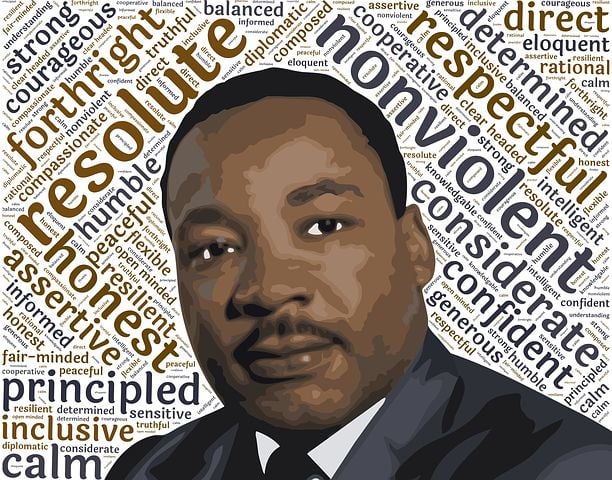
Santo D. Marabella | Posted on |
Honoring MLK: 60 Years After Letter from Birmingham Jail
“Injustice anywhere is a threat to justice everywhere.”
– Rev. Dr. Martin Luther King, Jr
Between 1956 and 1965, the Rev. Dr. Martin Luther King, Jr. was arrested and jailed 29 times. The charges, filed mostly by states in the South and the federal government included minor traffic violations, loitering, peaceful anti-segregation protests and made-up tax evasion claims.
Sixty years ago, in April of 1963, King lead a peaceful protest in Birmingham, Alabama. He called Birmingham the “most thoroughly segregated big city in the U.S. today,” according to a TIME magazine article (April 19, 1963). King demanded the creation of a “biracial commission, fairing hiring practices, amnesty for previously arrested protestors, an end to lunch-counter and other segregation. TIME called this a “poorly timed protest,” while his fellow clergymen criticized it as “unwise and untimely.”
Typically King was not one to defend against his critics. This time was different he said because he believed his colleagues were “men of genuine good will and that your criticisms are sincerely set forth.” So, during the 8 days he spent in a Birmingham, AL jail, he wrote the famous letter to the newspaper, addressing the criticisms he received from his fellow clergymen.
He was criticized for being in Birmingham at this time. King said that he was in Birmingham at this time because there was injustice. In his letter he said, “Injustice anywhere is a threat to justice everywhere. We are caught in an inescapable network of mutuality, tied in a single garment of destiny. Whatever affects one directly, affects all indirectly.”
He was criticized for leading the demonstration and not collaborating with black leaders. He wondered why there was not a “similar concern” for the conditions that sparked the demonstrations. Referencing the steps in a nonviolent campaign, he explained why the demonstrations were justified: “In any nonviolent campaign there are four basic steps: collection of the facts to determine whether injustices exist; negotiation; self purification; and direct action. We have gone through all these steps in Birmingham. There can be no gainsaying the fact that racial injustice engulfs this community.”
He was criticized for not being more patient. He wrote: “For years now I have heard the word ‘Wait!’ It rings in the ear of every Negro with piercing familiarity. This ‘Wait’ has almost always meant ‘Never.’ We must come to see, with one of our distinguished jurists, that ‘justice too long delayed is justice denied.’ We have waited for more than 340 years for our constitutional and God given rights.”
I recall a Town Hall on Race early in my career at Moravian University, but still some 30+ years after King’s letter. The Town Hall was the community’s response to racial tensions in the national news, perhaps sparked by the police beating of Rodney King. During the Town Hall, members of the community expressed compassion for those victimized by racial injustice, but expressed the same call for “patience.” A black student rose to speak. He asked, “how long must we wait?” The silence that followed spoke volumes. There was no answer that could justify having more patience, waiting more time.
So here we are, in 2023, the 60th anniversary year of the Letter from Birmingham and the March on Washington (I Have a Dream speech), and we’re still waiting for injustices to be righted – injustices that victimize Blacks, Jews, LGBTQ+, Women, the Disabled and other vulnerable and marginalized targets – folks for whom King would have cared and demonstrated.
How long must we wait???
